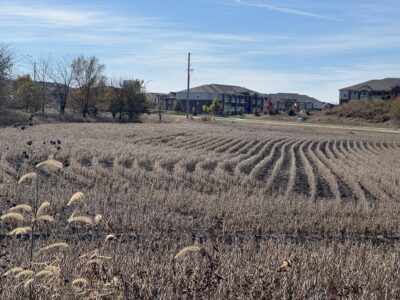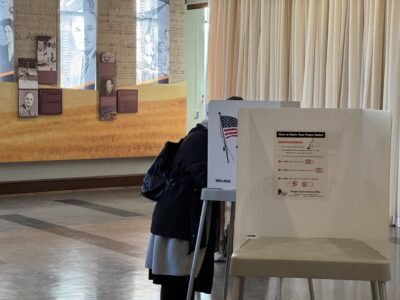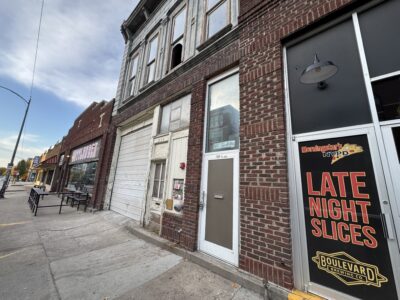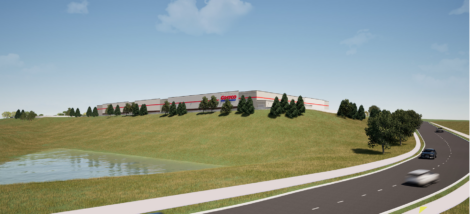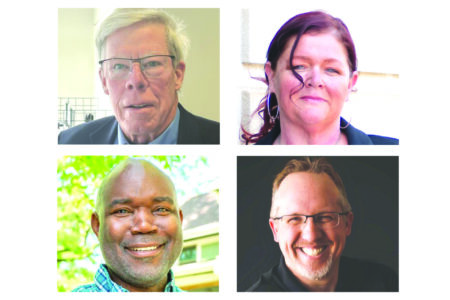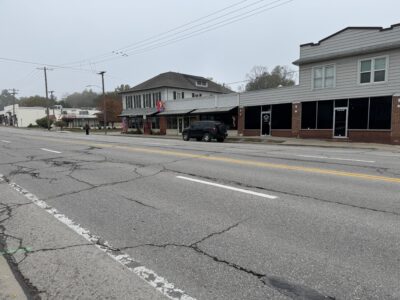
Development on KU’s West Campus close to bringing new grocery store company to town; incentives package creates deadline confusion

photo by: Courtesy: KU Endowment/Douglas County
This rendering shows a potential street-level view of The Crossing development, which would add commercial, retail and residential components to KU's West Campus area near Clinton Parkway and Iowa Street.
Let the grocery guessing games begin (and, no, this one doesn’t involve what the heck am I supposed to do with kale.)
Instead, KU Endowment officials will have the minds of shoppers wondering about what new grocery company is interested in coming to Lawrence. An Endowment leader has confirmed that it is in exclusive negotiations with a grocer to locate near 21st and Iowa streets in a planned multimillion dollar commercial and residential development on KU’s West Campus.
Monte Soukup, a senior vice president with KU Endowment, told county leaders recently that Endowment has strong interest from a grocery chain that currently does not operate in Lawrence, but he did not publicly identify the company.
“We are making very good progress there,” Soukup said.
Could it be a Price Chopper, which years ago publicly acknowledged it was interested in building a store in downtown Lawrence? What about Harps, an Arkansas-based chain that has built a store in De Soto, but hasn’t yet expanded elsewhere in the area? Or dare I even mention a Trader Joe’s or a Whole Foods? It could be several other possibilities too. Soukup said KU Endowment reached out to more than a dozen grocers, but now has focused its attention on a single company. He said a deal isn’t yet finalized, but the entities are preparing concept site plans and doing other such due diligence.
Soukup also recently has told city and county officials that interest is strong in other areas of the project, including with banks, fast-food chains, “coffee concepts,” and several local businesses who are looking for a new Lawrence location to try other ventures.
“There is a tremendous amount of interest,” he said earlier this month.

photo by: Courtesy: KU Endowment/Douglas County
This rendering, which was part of a presentation to the Douglas County Commission, shows how the The Crossing development on KU’s West Campus could look in future years.
Perhaps you are still trying to wrap your head around the idea of commercial development on KU’s West Campus. We’ve reported on the plan several times over the last couple of years, but you can be forgiven if you’re not fully up to speed. The project didn’t go through the city’s normal approval process that includes hearings at the Planning Commission and City Commission. (I know you never miss a Planning Commission hearing.) Instead, the project is allowed to develop without those approvals because of an inter-local agreement that gives KU the ability to develop on certain university land by consulting with the city rather than going through the full city-approval process.
In terms of why KU wants to have commercial development on its West Campus — which generally is the area north and west of Clinton Parkway and Iowa Street — that answer is a little simpler: It thinks the development will help attract students, researchers and private businesses that want to utilize KU research.
Soukup told city and county officials that such development will help KU and Lawrence stand out from other communities looking to attract high-paying, private research and development companies.
“What we really need is an innovation park where there are dozens of things to do within walking distance, and also something that will draw the public into the park so they can see the benefit of research,” Soukup said.
The West Campus area also will need a place to house these private research operations that KU hopes to attract. As we’ve reported, KU is developing some of that space now and preparing to develop more of it.
By 2024, KU intends to build two new research buildings — each totaling about $30 million — to attract a variety of researchers and businesses that want to use that research. One building would house what KU is calling the Kansas National Security Innovation Center, which would focus on research related to cyber security and other innovations that could be used by the homeland security or defense industries. A second building would house the Kansas Bio-Innovation & Sustainability Center, which would focus on research related to green energy and a host of environmental issues, among other topics.
In addition, KU envisions multiple other buildings being part of the Innovation Park project, including large buildings that would place university research space and private office space for corporations under the same roof. Over the next 15 years, KU envisions 10 buildings in the park that would provide 800,000 square feet of research, laboratory and office space.
Soukup spoke recently to the Douglas County Commission and also to the city-appointed Public Incentives Review Commission about the project. Among other updates he shared were:
• There will be about 400 apartment units served by parking garages as part of the project. Soukup said the apartments, which will be developed and operated by a private third party, won’t be geared toward the student housing market. Rather, the goal is to attract people who want to work in the park or other professionals who are drawn to the area.
• Passersby may have noticed large amounts of earthmoving work underway on the portion of West Campus that abuts Clinton Parkway. That work is for a large pond that will detain stormwater but also be a prominent water feature in a new greenbelt that is planned for West Campus. In addition to the pond and green space, plans call for two lit soccer fields to be constructed near the pond area. Those new fields are meant to compensate for the loss of some of the space at Shenk Sports Complex on KU, which will be the site of some of the future commercial development.

photo by: Courtesy: KU Endowment/Douglas County
This rendering shows a proposed greenbelt that would run through West Campus after the area is fully developed in coming years.
One other significant development for the project has been happening in meeting rooms. And, it has gotten a bit messy at times.
The project’s multimillion-dollar package of financial incentives on Friday received the first of several votes it will need for approval. The city’s Public Incentives Review Committee voted 4-1 on Friday to recommend approval for the incentives package that will give the project property tax rebates to cover about $14 million worth of need infrastructure work, like roads, sewers and parking.
The one vote against the incentives package, though, was significant. It was from Douglas County Commissioner Patrick Kelly, who has objected to the plan because he believes the amount of property taxes Douglas County would rebate back to the development is too much, when compared with how much the City of Lawrence is being asked to rebate.
At one point, I thought Kelly’s vote was setting up a potential hurdle for the project. That’s because I was aware that the Douglas County Commission has the ability to veto the incentive package being requested by the project. There have been signs that Kelly’s fellow commissioners have some of the same questions he has about the project.
What I wasn’t aware of, though, is that the county’s time period to veto the incentives project has expired. It appears the county wasn’t aware of it either.
Late on Friday, I found a timeline in an appendix of materials presented to the city’s public incentives board. That timeline stated that the county’s, and also the Lawrence school district’s, deadline for vetoing the incentives package expired on that very day, Friday, Dec. 16.
That appeared to be news to the county, although city officials said they did send all the public notices to the county about the incentives package, as required by state law. A city representative also told me the city met with county staff about the incentives package, although it was not clear to me how much the veto time period was discussed, if at all.
Regardless, the veto is a moot point now. If county commissioners don’t like the tax incentive deal for the project, they technically don’t have a way of pulling the county out of the incentive package. What commissioners can do is express their concerns and questions to Lawrence city commissioners, who still must take a series of votes in February before the project can become final.
Kelly told me via email that he understands the county can ask the city to address the county’s concerns, but he said it seems like the process could be better for both the county and the school district — which also stands to rebate property taxes — in the future.
“My hope is that the City of Lawrence, Douglas County, and the Lawrence Public Schools can continue to improve on how we develop these projects with sensitivity to the specific improvements that will be funded by these incentive tax dollars,” Kelly said via email.
The veto period is set by state law, and is nothing that the city or county had any ability to change. It has been several years since the state’s tax increment financing law has been used in Lawrence, so that also may have led to some confusion about the veto deadline.
Whatever the case, be on the lookout for whether this deadline confusion creates tension between the city and the county, which at times has had a relationship with its fair share of tension.


